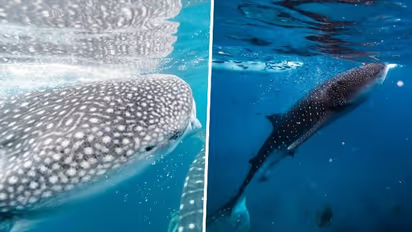National Whale Shark Day: Date, history, significance

Synopsis
National Whale Shark Day, celebrated on August 30th, honors these majestic creatures and underscores their ecological importance. Originating in the Maldives, it advocates research, marine protected areas, sustainable tourism, international collaboration, and education for effective whale shark conservation
National Whale Shark Day is an annual observance that celebrates the awe-inspiring marine giant, the whale shark (Rhincodon typus), and aims to raise awareness about its conservation needs. This majestic species, known for its massive size and gentle nature, holds a vital place in our oceans' ecosystems. Through a combination of historical significance and contemporary conservation efforts, National Whale Shark Day serves as a reminder of the urgent need to protect these incredible creatures for generations to come.
Date: National Whale Shark Day is celebrated on August 30th each year. This date was chosen to coincide with the peak of the whale shark migration season in certain regions, offering a poignant moment to reflect on the species' importance and promote global conservation efforts.
ALSO READ: National Lemon Juice Day 2023: Date, history, significance
History: The history of National Whale Shark Day traces back to the growing concern over the declining population of whale sharks due to human activities. As more research shed light on the vulnerability of these gentle giants, conservationists and marine enthusiasts alike began advocating for a dedicated day to honor and protect them. In 2016, the Maldives formally declared August 30th as National Whale Shark Day, pioneering efforts to spotlight the significance of these magnificent creatures.
Significance: Whale sharks hold immense ecological significance as filter-feeding organisms that help maintain the balance of marine food chains. Their large-scale migrations also make them valuable indicators of ocean health. Additionally, these charismatic creatures play a crucial role in ecotourism, contributing to local economies and fostering a sense of wonder and responsibility toward marine conservation.
Conservation Efforts: To safeguard whale sharks, comprehensive conservation efforts have gained momentum globally. These include:
1. Research and Monitoring: Researchers collaborate to track whale shark movements, behavior, and breeding patterns. Satellite tagging and photo-identification techniques provide insights into migration routes and population dynamics, aiding in the formulation of targeted conservation strategies.
2. Marine Protected Areas: Establishing marine protected areas (MPAs) helps safeguard critical habitats for whale sharks and other marine life. These areas limit human impact, allowing the species to thrive while preserving the delicate balance of marine ecosystems.
3. Sustainable Tourism: Promoting responsible ecotourism provides economic incentives for local communities to protect whale sharks. Regulations that minimize disturbance and maintain safe distances from these creatures ensure that tourism contributes positively to conservation efforts.
4. International Collaboration: Whale shark conservation transcends national boundaries. Collaborative efforts between governments, organizations, and researchers are essential to develop and implement conservation policies that effectively protect these animals throughout their range.
5. Education and Outreach: Raising public awareness about the importance of whale sharks fosters a sense of stewardship for marine ecosystems. Educational campaigns, documentaries, and public engagement initiatives help inspire action to preserve these incredible creatures.
In conclusion, National Whale Shark Day serves as a vital platform to celebrate the magnificence of whale sharks while emphasizing the need for their protection. As we honor their beauty and significance, it is our collective responsibility to ensure their survival for future generations through diligent conservation efforts and a commitment to preserving the oceans they call home
Explore the latest Lifestyle News covering fashion, wellness, travel, Food and Recipes, and more. Stay updated with trending Health News, fitness tips, and expert insights to inspire your daily living. Discover personalized lifestyle trends that keep you stylish and informed. Download the Asianet News Official App from the Android Play Store and iPhone App Store for everything that adds value to your everyday life.